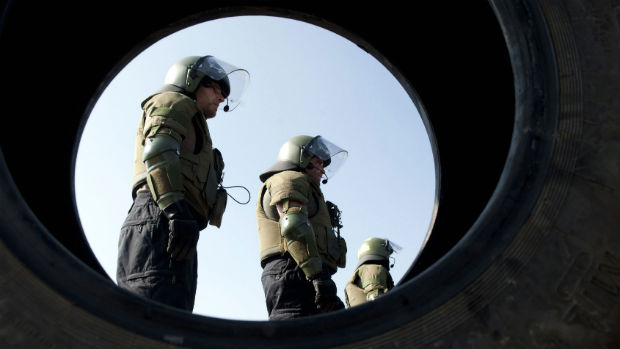Nato to create 'spearhead' strike force to counter Russia
Russia says it will review its own military doctrine in response to the 'growing Nato threat' in Europe

A free daily email with the biggest news stories of the day – and the best features from TheWeek.com
You are now subscribed
Your newsletter sign-up was successful
Nato will create a new high-readiness "spearhead" strike force that can be quickly deployed to the Baltic to respond to Russian aggression, officials have said.
The Nato Response Force will be a multinational unit including land, air, naval and special operation forces which can be "deployed anywhere in the world, for collective defence or crisis management," Nato secretary general Anders Fogh Rasmussen announced ahead of the organisation's summit in Wales this week.
Rasmussen said that the 4,000-strong force would "travel light but strike hard".
The Week
Escape your echo chamber. Get the facts behind the news, plus analysis from multiple perspectives.

Sign up for The Week's Free Newsletters
From our morning news briefing to a weekly Good News Newsletter, get the best of The Week delivered directly to your inbox.
From our morning news briefing to a weekly Good News Newsletter, get the best of The Week delivered directly to your inbox.
The creation of the force "responds to Russia’s aggressive behaviour," the Danish head of Nato said, but will also "equip the alliance to respond to all security challenges, wherever they may arise".
Nato said that once the force was established, it could be mobilised within 48 hours.
Russia is likely regard the creation of a high-readiness force as an aggressive move, The Guardian says. Nato has so far "struggled to find a response" to suspected Russian intervention in the Ukraine crisis that began in February. To date, the alliance's response to the crisis has been to conduct training exercises in the Baltic states.
The rapid-response force is an effort to address Nato's "lack of speed and flexibility", The Guardian says.
A free daily email with the biggest news stories of the day – and the best features from TheWeek.com
After the address, Russia announced that it would make alterations to its own military structure.
Mikhail Popov, a Kremlin adviser, said that the "deteriorating relations" with the US and Nato would be considered in its upcoming military overhaul, the BBC reports.
Popov, deputy secretary of Russia's National Security Council, said that "the military infrastructure of Nato member states" was "getting closer to our borders, including via enlargement".
Nato's actions were becoming one of the main "external threats" to Russia, he told Russia's RIA news agency.
"Nato's planned action... is evidence of the desire of US and Nato leaders to continue their policy of aggravating tensions with Russia," Mr Popov said.
-
 The ‘ravenous’ demand for Cornish minerals
The ‘ravenous’ demand for Cornish mineralsUnder the Radar Growing need for critical minerals to power tech has intensified ‘appetite’ for lithium, which could be a ‘huge boon’ for local economy
-
 Why are election experts taking Trump’s midterm threats seriously?
Why are election experts taking Trump’s midterm threats seriously?IN THE SPOTLIGHT As the president muses about polling place deployments and a centralized electoral system aimed at one-party control, lawmakers are taking this administration at its word
-
 ‘Restaurateurs have become millionaires’
‘Restaurateurs have become millionaires’Instant Opinion Opinion, comment and editorials of the day
-
 Putin’s shadow war
Putin’s shadow warFeature The Kremlin is waging a campaign of sabotage and subversion against Ukraine’s allies in the West
-
 Alexei Navalny and Russia’s history of poisonings
Alexei Navalny and Russia’s history of poisoningsThe Explainer ‘Precise’ and ‘deniable’, the Kremlin’s use of poison to silence critics has become a ’geopolitical signature flourish’
-
 What happens now that the US-Russia nuclear treaty is expiring?
What happens now that the US-Russia nuclear treaty is expiring?TODAY’S BIG QUESTION Weapons experts worry that the end of the New START treaty marks the beginning of a 21st-century atomic arms race
-
 Epstein files topple law CEO, roil UK government
Epstein files topple law CEO, roil UK governmentSpeed Read Peter Mandelson, Britain’s former ambassador to the US, is caught up in the scandal
-
 Iran and US prepare to meet after skirmishes
Iran and US prepare to meet after skirmishesSpeed Read The incident comes amid heightened tensions in the Middle East
-
 Israel retrieves final hostage’s body from Gaza
Israel retrieves final hostage’s body from GazaSpeed Read The 24-year-old police officer was killed during the initial Hamas attack
-
 China’s Xi targets top general in growing purge
China’s Xi targets top general in growing purgeSpeed Read Zhang Youxia is being investigated over ‘grave violations’ of the law
-
 Ukraine, US and Russia: do rare trilateral talks mean peace is possible?
Ukraine, US and Russia: do rare trilateral talks mean peace is possible?Rush to meet signals potential agreement but scepticism of Russian motives remain